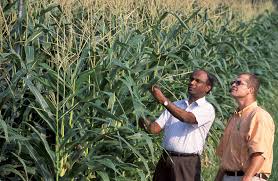Agricultural research institutions play a vital role in advancing agricultural practices, improving food security, and promoting sustainable development. These institutions are dedicated to exploring and addressing the diverse challenges that agriculture faces, including crop productivity, pest and disease management, soil health, and the effects of climate change.
Agricultural research institutions contribute to the development of innovative technologies, enhanced farming techniques, and improved crop varieties that can withstand environmental stressors and increase yields.
Globally, agricultural research institutions include a mix of government-funded organizations, universities, and private sector entities, all working collaboratively to push the boundaries of agricultural science.
For example, institutions such as the International Maize and Wheat Improvement Center (CIMMYT), the International Rice Research Institute (IRRI), and national bodies like the United States Department of Agriculture (USDA) conduct research that impacts agricultural practices worldwide.
These organizations collaborate with local farmers, governments, and industry leaders to ensure their findings are relevant and easily applicable at the grassroots level.
Through their efforts, agricultural research institutions address key areas such as sustainable land use, water management, and food safety, while also focusing on social and economic issues related to farming communities.
They contribute to knowledge-sharing and capacity-building by providing training and resources for farmers and agricultural professionals, empowering them to implement best practices and improve livelihoods.
Agricultural research institutions are essential for advancing the agricultural sector, tackling global food security challenges, and supporting the transition to more sustainable farming methods.
Their ongoing research and innovation not only improve crop yields and resilience but also help build a more sustainable and equitable food system for the future.
Importance of Agricultural Research

Agricultural research plays a crucial role in enhancing productivity, sustainability, and resilience in food production systems:
1. Innovation and Technology: Research drives innovation in crop breeding, pest management, soil health, and agricultural technologies, improving farm efficiency and resource use.
2. Food Security: Research develops high-yielding crop varieties, resilient farming practices, and drought-resistant crops, ensuring stable food production amidst climate variability and population growth.
3. Sustainability: Sustainable agriculture research promotes eco-friendly practices, biodiversity conservation, and natural resource management, reducing environmental impacts and enhancing agricultural resilience.
4. Economic Development: Agricultural research fosters rural development, income generation, and market competitiveness, supporting livelihoods and economic growth in agricultural communities.
Types of Agricultural Research Institutions
Agricultural research institutions encompass diverse organizational structures and research focuses:
1. Government Research Institutes: National and state-funded agencies conduct agricultural research on policy development, technology transfer, and agricultural extension services.
2. Universities and Colleges: Academic institutions conduct research on crop science, animal husbandry, agribusiness, and agricultural economics, integrating education with practical research applications.
3. International Research Centers: Global organizations, such as CGIAR (Consultative Group on International Agricultural Research), focus on global food security, sustainable development goals, and climate-resilient agriculture.
4. Private Research Organizations: Agribusiness companies, seed corporations, and biotechnology firms invest in research and development (R&D) to enhance agricultural productivity, crop protection, and genetic improvements.
Key Functions of Agricultural Research Organizations
Agricultural research organizations perform essential functions to advance agricultural knowledge and innovation:
1. Research and Development: Conducting scientific studies, field trials, and experiments to improve crop yields, livestock health, and agricultural practices.
2. Technology Transfer: Disseminating research findings, best practices, and innovations to farmers, extension workers, and agricultural stakeholders through training programs and outreach activities.
3. Policy Support: Providing scientific evidence, data analysis, and policy recommendations to inform agricultural policies, regulations, and investment decisions at local, national, and international levels.
4. Collaboration and Partnerships: Collaborating with governments, universities, NGOs, and private sectors to foster interdisciplinary research, leverage resources, and address complex agricultural challenges.
Read Also: The Most Lucrative between Production of Fish Fingerlings or Raising them to Table Size
Major Global Agricultural Research Institutions

Several prominent organizations lead global efforts in agricultural research and development:
1. CGIAR (Consultative Group on International Agricultural Research): A global partnership of research centers focusing on improving agricultural productivity, nutrition, and resilience in developing countries.
2. International Rice Research Institute (IRRI): Dedicated to rice research and development, IRRI aims to alleviate poverty and hunger through sustainable rice production and improved farming systems.
3. International Maize and Wheat Improvement Center (CIMMYT): Focuses on maize and wheat research to enhance food security, environmental sustainability, and livelihoods in maize and wheat-growing regions.
4. World Agroforestry Centre (ICRAF): Conducts research on agroforestry systems to improve land use, biodiversity conservation, and climate resilience in agricultural landscapes.
5. Food and Agriculture Organization (FAO) of the United Nations: Provides global leadership in food security, agricultural development, and sustainable natural resource management through research, policy advice, and capacity building.
Regional Agricultural Research Centers
Regional agricultural research centers play a vital role in addressing specific agricultural challenges faced by local communities. These centers focus on research tailored to regional needs, which helps improve agricultural practices and outcomes.
1. Local Adaptation of Technologies: Regional centers develop and adapt agricultural technologies, practices, and crop varieties suited to local climates, soils, and market conditions.
2. Farmer Engagement: These centers often work closely with local farmers, ensuring their research addresses real-world issues and incorporates farmers’ knowledge and needs into research projects.
3. Extension Services: They provide extension services to disseminate research findings, share best practices, and train farmers on new techniques and technologies.
4. Collaboration with Local Institutions: Regional centers frequently collaborate with universities, governmental agencies, and NGOs to leverage resources and expertise, enhancing the effectiveness of agricultural research.
Collaborative Research Initiatives in Agriculture
Collaborative research initiatives bring together various stakeholders to address complex agricultural challenges and enhance innovation.
1. Multi-Stakeholder Partnerships: Collaborations between governments, universities, NGOs, and private sectors foster knowledge exchange and resource sharing, leading to innovative solutions.
2. International Research Programs: Initiatives like the CGIAR and the Global Alliance for Climate-Smart Agriculture promote research collaboration across borders, focusing on global agricultural issues like climate change, food security, and biodiversity.
3. Regional Collaborations: Regional initiatives focus on shared challenges within specific areas, allowing for localized research and solutions tailored to particular agricultural systems and communities.
4. Public-Private Partnerships: Collaborations between public research institutions and private companies enhance research capacity, accelerate technology development, and facilitate the transfer of research outcomes to farmers.
Funding Sources for Agricultural Research
Funding for agricultural research is crucial for sustaining innovation and addressing food security challenges.
1. Government Funding: National and local governments provide significant funding for public agricultural research institutions, supporting projects that aim to enhance food security and rural development.
2. International Organizations: Global institutions such as the United Nations, World Bank, and various NGOs offer grants and financial support for agricultural research, particularly in developing countries.
3. Private Sector Investment: Agribusiness companies invest in research and development to create new products, improve crop varieties, and enhance agricultural technologies, often focusing on profit-driven research.
4. Philanthropic Contributions: Foundations and philanthropic organizations contribute funding for specific agricultural research projects aimed at addressing global challenges, such as food security and climate resilience.
5. Crowdfunding and Collaborative Financing: Emerging financing models, including crowdfunding and collaborative financing platforms, allow individuals and organizations to fund innovative agricultural research projects.
Read Also: How to Control Feeding Struggle among Fishes in the same Pond
Impact of Agricultural Research on Food Security

Agricultural research has a profound impact on food security, influencing productivity, sustainability, and resilience in food systems.
1. Increased Crop Yields: Research leads to the development of high-yielding and disease-resistant crop varieties, contributing to higher food production levels.
2. Sustainable Practices: Research promotes sustainable agricultural practices that conserve resources, enhance soil health, and reduce environmental impacts, ensuring long-term food security.
3. Adaptation to Climate Change: Agricultural research develops climate-resilient practices and technologies, enabling farmers to adapt to changing climatic conditions and maintain productivity.
4. Enhanced Livelihoods: Improved agricultural practices resulting from research enhance the livelihoods of farmers, contributing to rural development and economic stability.
5. Policy Development: Research findings inform policy decisions, helping governments and organizations create effective strategies for addressing food security challenges.
Here’s an article structured around innovations and technologies in agricultural research, challenges facing agricultural research institutions, future trends in agricultural research, and the role of agricultural research in sustainable development:
Innovations and Technologies in Agricultural Research
Agricultural research has been at the forefront of innovation, bringing forth technologies that enhance productivity, sustainability, and efficiency:
1. Precision Agriculture: This approach uses data analytics, GPS, and IoT (Internet of Things) sensors to optimize field-level management regarding crop farming. Farmers can monitor soil moisture, nutrient levels, and crop health in real time, allowing for more efficient use of resources.
2. Biotechnology: Genetic engineering, CRISPR, and other biotechnological advancements enable the development of crops that are resistant to pests, diseases, and extreme weather conditions. These innovations lead to higher yields and reduced reliance on chemical inputs.
3. Drones and Remote Sensing: Drones equipped with advanced imaging technology can monitor crop health, assess soil conditions, and even apply fertilizers or pesticides in a targeted manner. This not only reduces costs but also minimizes environmental impacts.
4. Vertical Farming: Innovations in indoor agriculture, including vertical farming, utilize controlled environments to grow crops without soil. This method maximizes space and resources, making it suitable for urban settings and areas with limited arable land.
5. Mobile Applications: Farmers can access information on weather forecasts, market prices, pest control, and best practices through mobile apps. These tools empower farmers to make informed decisions quickly and efficiently.
Challenges Facing Agricultural Research Institutions
Despite the significant advancements in agricultural research, institutions face various challenges that hinder their effectiveness:
1. Funding Limitations: Many research institutions struggle with limited budgets, affecting their ability to conduct extensive research, hire skilled personnel, and invest in advanced technologies.
2. Data Access and Sharing: Access to relevant data and research findings can be restricted, making it difficult for researchers and practitioners to collaborate effectively and build on each other’s work.
3. Climate Change Impacts: The increasing unpredictability of weather patterns, rising temperatures, and extreme weather events complicate research efforts, necessitating adaptive measures and innovative solutions.
4. Capacity Building: There is often a shortage of trained professionals in agricultural research, limiting the capacity of institutions to undertake complex studies and implement innovative practices effectively.
5. Global Health Crises: Pandemics, such as COVID-19, disrupt research activities, field trials, and collaboration, further complicating the development and dissemination of agricultural innovations.
Future Trends in Agricultural Research
The future of agricultural research is poised for exciting developments, driven by technological advancements and changing global dynamics:
1. Climate-Smart Agriculture: Research will increasingly focus on practices that enhance resilience to climate change, promoting sustainable farming methods that reduce greenhouse gas emissions and enhance carbon sequestration.
2. Digital Agriculture: The integration of artificial intelligence, big data, and machine learning in agriculture will revolutionize decision-making processes, enabling farmers to optimize productivity and resource use.
3. Focus on Nutrition: Agricultural research is shifting towards improving food quality and nutrition, emphasizing biofortification and the development of crops that provide essential vitamins and minerals.
4. Collaborative Research Networks: Increased collaboration between public and private sectors, NGOs, and international organizations will foster innovation and ensure that research addresses real-world agricultural challenges.
5. Regenerative Agriculture: This holistic approach emphasizes restoring soil health, increasing biodiversity, and improving water cycles, focusing on sustainability and long-term ecosystem health.
Role of Agricultural Research in Sustainable Development
Agricultural research plays a critical role in promoting sustainable development by addressing key global challenges:
1. Food Security: Research contributes to increasing agricultural productivity and resilience, ensuring that food systems can meet the demands of a growing population while reducing hunger and malnutrition.
2. Environmental Sustainability: By promoting eco-friendly practices and technologies, agricultural research helps protect natural resources, conserve biodiversity, and mitigate the impacts of climate change on ecosystems.
3. Economic Growth: Sustainable agricultural practices foster rural development, create jobs, and support local economies, contributing to overall economic growth and poverty reduction.
4. Social Equity: Research efforts focus on empowering smallholder farmers, women, and marginalized communities, ensuring that the benefits of agricultural innovations are accessible to all.
5. Policy Development: Evidence-based research informs policymakers, guiding the formulation of policies that support sustainable agriculture, rural development, and climate resilience.
Do you have any questions, suggestions, or contributions? If so, please feel free to use the comment box below to share your thoughts. We also encourage you to kindly share this information with others who might benefit from it. Since we can’t reach everyone at once, we truly appreciate your help in spreading the word. Thank you so much for your support and for sharing!
Read Also: Everything You Need to Know About Extinction of Animals

